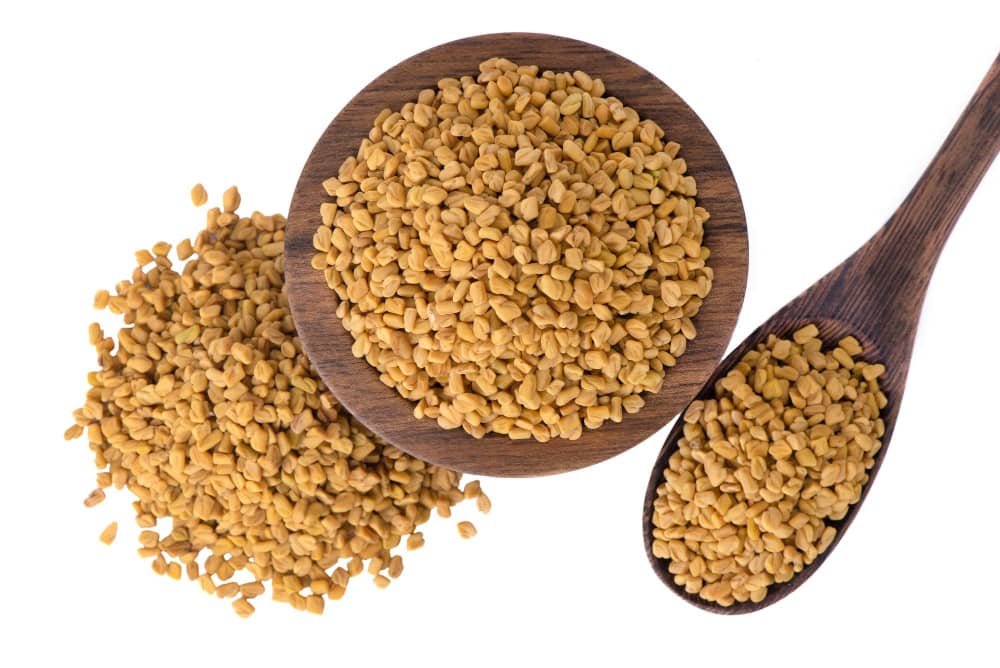Fenugreek, a herb widely known for its aromatic and medicinal properties, has been used for centuries in various cultures across the globe. With its origins traced back to the Mediterranean region, fenugreek (Trigonella foenum-graecum) is now cultivated worldwide due to its numerous health benefits and culinary uses.
Its distinctive aroma and slightly bitter taste have made it a popular ingredient in cooking, particularly in Indian, Middle Eastern, and North African cuisines. However, fenugreek’s benefits go beyond enhancing flavors; it has long been recognized for its potential health-promoting properties.
This versatile plant has found its way into traditional medicine practices as well as modern scientific research, captivating the interest of health enthusiasts and scientists alike.

Overview of Fenugreek
In this article, we will explore the fascinating world of fenugreek, examining its history, nutritional value, potential health benefits, and practical applications in daily life. So let us delve into the depths of this remarkable herb and uncover all that fenugreek has to offer.
Fenugreek, scientifically known as Trigonella foenum-graecum, is an herb widely recognized for its culinary and medicinal properties. With a rich history spanning thousands of years, this versatile plant has been utilized by various cultures across the globe for both its nutritional value and therapeutic benefits.
From ancient Ayurvedic practices in India to traditional Chinese medicine and Mediterranean cuisine, fenugreek leaves, seeds, and extracts have found their way into a wide range of applications.
This article aims to provide a comprehensive overview of fenugreek by exploring its botanical characteristics, nutritional composition, historical uses, modern applications in health and wellness, and any potential side effects or precautions associated with its consumption.
Health Benefits of Fenugreek
Fenugreek, a popular herb used in traditional medicine for centuries, offers numerous health benefits. One of its key advantages is its potential to improve digestion. It contains compounds that stimulate the production of digestive enzymes, promoting healthy gut function and relieving indigestion and constipation.
Moreover, fenugreek has been shown to help regulate blood sugar levels. It contains soluble fiber that slows down glucose absorption in the bloodstream, reducing spikes in blood sugar after meals. This makes it particularly beneficial for individuals with diabetes or insulin resistance.
Additionally, fenugreek has been associated with increased milk production in breastfeeding mothers. The herb stimulates the hormones involved in milk production and can significantly boost milk supply within a few days of consumption.
Fenugreek offers a range of health benefits, including improved digestion, better blood sugar control, and increased milk production for breastfeeding mothers.

Nutritional Value of Fenugreek
Fenugreek is a popular herb in many cuisines and traditional medicine practices due to its various health benefits. When it comes to its nutritional value, fenugreek contains an array of essential vitamins and minerals that contribute to overall well-being.
It is particularly rich in vitamin C, which supports immune function and collagen production. Additionally, fenugreek is a good source of iron, calcium, magnesium, and potassium – all crucial for maintaining healthy bones and muscles.
Furthermore, fenugreek is known for its high fiber content, which benefits digestive health. The fiber present in fenugreek aids in digestion by promoting regular bowel movements and preventing constipation. Moreover, this herb has been linked to improved blood sugar control as it helps slow down the absorption of sugars into the bloodstream. This can be especially beneficial for individuals with diabetes or those at risk of developing the condition.
In conclusion, incorporating fenugreek into your diet can provide you with a wide range of essential nutrients supporting various health aspects. This versatile herb offers numerous nutritional benefits worth exploring further, from boosting your immune system with vitamin C to improving digestion through its high fiber content.
How to Use Fenugreek in Cooking
Fenugreek, also known as methi (in Hindi), is an aromatic herb commonly used in Indian, Middle Eastern, and North African cuisines. The plant produces small seeds with a strong and distinctive flavor that can add depth and complexity to various dishes. Fenugreek has a slightly bitter taste reminiscent of burnt sugar or maple syrup, making it a popular ingredient in curries, stews, pickles, and bread.
One of the most common ways to use fenugreek in cooking is by incorporating its seeds into spice blends. These blends are often used as a base for curry powders or as flavor enhancers for meat rubs and marinades. To release their full flavor potential, fenugreek seeds are usually toasted in a dry pan before being ground into powder or added directly to the dish.
Additionally, fenugreek leaves can be used fresh or dried to impart a milder flavor compared to the seeds. They are commonly used in vegetarian dishes such as saag (spinach curry) or mixed with other greens in salads and stir-fries. The leaves can also be steeped in hot water to make herbal teas that are believed to offer various health benefits like aiding digestion and reducing inflammation.
Fenugreek is an incredibly versatile herb that can enhance the taste profile of numerous recipes. Whether you choose to use its seeds or leaves, adding fenugreek brings a unique twist to your culinary creations while providing potential health benefits at the same time.

Tips for Growing Fenugreek at Home
Fenugreek, also known as Methi, is an herb that has been used for centuries due to its numerous health benefits. It is native to the Mediterranean region, but can be easily grown at home with a little care and attention. Fenugreek leaves are often used in cooking for their unique flavor and aroma, while the seeds are commonly used as a spice or herbal supplement.
1. Choosing the right location: Fenugreek thrives in full sun but can also tolerate partial shade. Make sure to select a spot in your garden or balcony that receives at least 4-6 hours of direct sunlight each day.
2. Preparing the soil: Fenugreek prefers well-draining soil with a pH level between 6 and 7. Add organic matter such as compost or aged manure to improve drainage and fertility before planting. Avoid heavy clay soils that tend to retain water.
3. Sowing fenugreek seeds: Directly sow fenugreek seeds into the prepared soil about half an inch deep and 2 inches apart from each other. Water gently after sowing to keep the soil moist until germination occurs, which usually takes around one week.
Potential Side Effects of Eating Fenugreek
Fenugreek is a herb commonly used in cooking and traditional medicine. While it offers numerous health benefits, such as improving digestion and reducing inflammation, there are potential side effects that individuals should be aware of when consuming fenugreek.
One possible side effect of eating fenugreek is allergic reactions. Some individuals may be allergic to fenugreek, resulting in symptoms like skin rashes, itching, and swelling. Severe allergic reactions can even cause difficulty breathing or anaphylaxis, which requires immediate medical attention.
Another potential side effect is gastrointestinal issues. Fenugreek has been known to cause gastrointestinal discomfort in some people, including bloating, gas, and diarrhea. These digestive disturbances are usually temporary and subside once the body adjusts to the herb’s consumption.
It is important for individuals considering adding fenugreek to their diet or using it as a supplement to be aware of these potential side effects and consult with a healthcare professional if they have any concerns or pre-existing conditions that may interact negatively with fenugreek consumption.
Conclusion
In conclusion, fenugreek is a versatile and beneficial herb that has been used for centuries in various cultures for its medicinal properties. Its numerous health benefits include improving digestion, reducing inflammation, boosting testosterone levels, and promoting milk production in breastfeeding mothers.
Additionally, fenugreek seeds are rich in fiber, protein, and antioxidants. They can be consumed in various forms such as capsules, powders, or added to dishes as a spice.
Furthermore, fenugreek has also been found to have potential anti-diabetic effects by helping regulate blood sugar levels and improve insulin sensitivity. Studies have shown that regular consumption of fenugreek may help lower fasting blood glucose levels and reduce the risk of developing type 2 diabetes. Moreover, fenugreek extract has been shown to possess anti-cancer properties and may aid in preventing certain types of cancer.
Incorporating fenugreek into your diet or supplement routine can provide numerous health benefits. However, it is important to consult with a healthcare professional before starting any new herbal regimen to ensure it is safe and suitable for your individual needs.
With its long history of use and promising research findings, fenugreek continues to be an intriguing herb worth exploring for its potential health-promoting effects.










